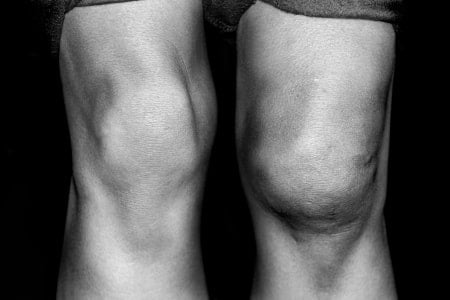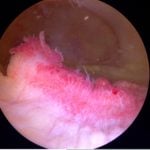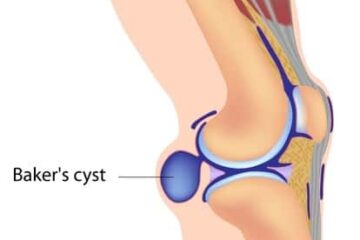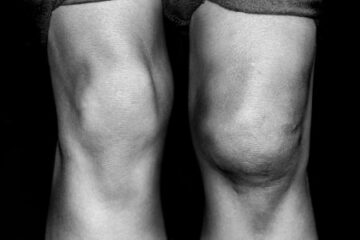
Knee swelling after an injury can be sign that your knee injury is serious. In general, knee swelling is a very common reason to see an Orthopedic Surgeon. Knee swelling after an injury is usually due to bleeding in the knee joint. Many young athletes with a swollen knee are wondering if they tore their ACL. Many adults with knee swelling after an injury have a meniscus tear. As an Orthopedic Surgeon in Westchester County, NY I am deep in the heart of Lyme Disease country. Lyme disease is another very common reason why your knee might be swelling.

Our knees can swell for a multitude of reasons. Swelling after trauma is usually due to blood in he joint. Swelling that occurs in your knee without trauma is usually clear or yellow. This type of swelling is usually seen in people with swelling because of arthritis. Some of you have swelling because of an injury and some of you simply woke up with a swollen knee.
The causes of knee swelling include:
- Lyme Disease
- Osteoarthritis
- Trauma or Injury ( ACL tears)
- Meniscus Tears
- Fractures
- Synovitis (inflammation of lining of our joints)
- Gout
- Infection
- Other forms of arthritis (RA, Lupus, Psoriasis, etc)
Causes of Knee Swelling

The type of fluid in your knee can help us determine what is wrong with your knee. It is not uncommon for us to recommend putting a needle into your knee for a fluid sample. That sample can be tested to look for common sources of knee swelling. As you’ll see below… just the appearance of the fluid can help us determine what is wrong.
Types of Knee Fluid:
- clear: Clear fluid in a swollen knee is usually due to some form of inflammation. The most common reason for clear fluid in the knee is osteoarthritis.
- cloudy: if the fluid in your knee is cloudy, eg. you can not see through the syringe, then the possible diagnoses include gout, lyme disease, and an early infection.
- bloody: if the fluid taken out of your knee is bloody then you likely tore a meniscus, injured a ligament or potenitally have a small fracture in the knee. When a fracture is present, we will also see a little fat in the fluid.
- Pus: if the fluid in your knee looks like pus then you have a very serious infection.
When your knee swells and you do not recall an obvious injury, especially in my area of New York, Lyme Disease is very high on the list of possibilities. Lyme Disease can be quite difficult to identify and manage. Many people test positive for it but do not have the disease. Yet, if you have a swollen knee, no recent injury and live in an endemic region you should be evaluated very soon after the swelling begins. The earlier you initiate treatment the easier it is to cure. In order to diagnose Lyme Disease we will usually order a blood test and take a sample of fluid from your knee for further testing. Lyme disease can be diagnosed year-round. Especially with a mild winter. So a swollen knee in February could very well be Lyme Disease.
Osteoarthritis is by nature and inflammatory condition. As such, in many people with arthritis you will notice that your knee swells after certasin activities. As your arthritis worsens you may notice that the swelling is always present in the knee. Removing the fluid from an arthritic knee will usually make you feel better. Unfortunately for many arthritis sufferers, the swelling might return very rapidly.
Patients with Gout are usually very easy to identify in the office. They have no history of an injury, but their knee is warm and swollen, and they are in a lot of pain. Gout is caused by a crystal forming in your joint. Those crystals cause a reaction by the cells in your knee trying to breakdown the crystals. Those cells end up rupturing and causing a very significant synovitis or inflammatory reaction. Most patients with gout respond very well to removal of the fluid, a steroid injection followed by certain medications to treat the inflammation and minimize the chance that more crystals will deposit in your knee.
Knee swelling occurs for many reasons. Often times it is important to be seen by your Orthopedic Surgeon. Lyme Disease and other causes of swelling require prompt diagnosis and treatment in order to maximize your chance of a cure or success in returning to your prior quality of life.













